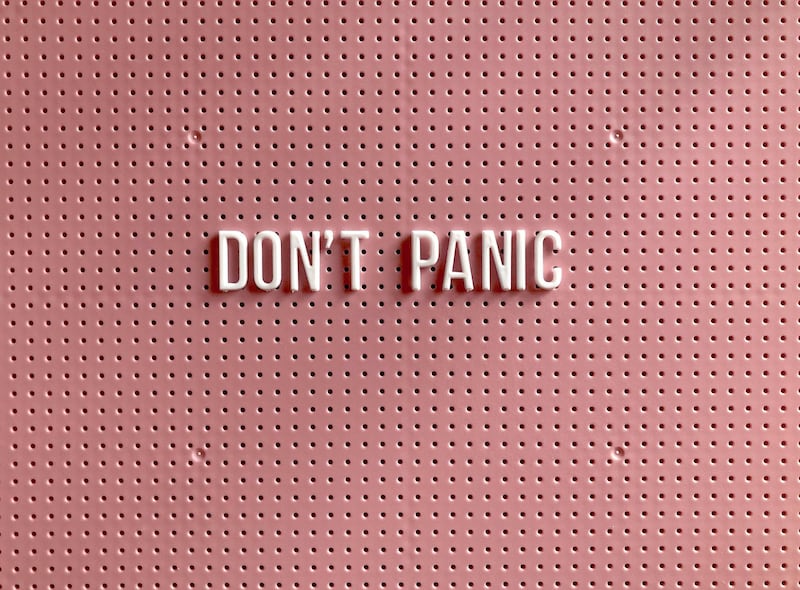"It feels like life or death," Hollywood actress Amanda Seyfried revealed on The Today Show last week, about the panic attacks she's experienced over the past few years.
"That's what a panic attack is, really. Your body just goes into fight or flight. The endorphin rush and the dump that happens after the panic attack is so extraordinary," the actress, 35, said.
"You just feel so relieved and your body is just kind of recovered in a way. It’s so bizarre because it’s physiological, but it starts in your head.”

The Mamma Mia! star, who is up for Best Supporting Actress at this week's Oscars, is far from alone in her experience, with a 2017 study by the Institute for Health Metrics and Evaluation estimating that 10.7 per cent of people globally, or 792 million, live with a mental health disorder. Of that number, 3.8 per cent, around 284 million people, have an anxiety disorder, the category panic attacks fall under.
Defined medically as combining both physical and mental effects, panic attacks are often marked by feelings of intense anxiety, increased heart rate, hyperventilation, dizziness and sweating. Patients also talk about experiencing feelings that something bad is about to happen, which they are powerless to control.
‘I didn’t know what it was’
"A panic attack is an abrupt surge of intense fear or discomfort that reaches a peak within minutes and may last from 10 to 15 minutes, or even up to an hour," says Dr Arun Kumar, a specialist psychiatrist at Aster Clinic in Dubai. "This sudden surge can occur from a calm state or an anxious state, and the first attack often occurs completely spontaneously."
"Out of the blue" is how David*, a business manager, 40, from Abu Dhabi, describes the first panic attack he experienced aged 38.
“I was at work, and just had this feeling that something bad was going to happen,” he says. “I don’t know where the notion came from, but it was intensely powerful and I found that suddenly I couldn’t control my heart rate or my breathing. I was trying to take in air, but it felt like there wasn’t enough oxygen in the room.
“I made it to the bathroom and just stayed in a stall for about half an hour until I’d stopped shaking. I called my wife afterwards, but couldn’t really explain the feeling because I didn’t even know myself what it was.”
But what can cause these debilitating episodes?
“The known common triggers can be, but are not limited to, injury from accidents or surgery, illness, childhood separations, interpersonal conflict or loss, drug addiction or abuse, and withdrawal from certain medications,” says Dr Sarwan Saleem, a general practitioner at Dubai London Clinic, Dubai Festival City Mall. “Or a recent temporary stressor a person cannot get their head around.”
The effects, both mental and physical

Panic attacks can be triggered by myriad external experiences, such as crowded or enclosed places or, alternatively, wide-open spaces. Work, family and relationship issues, trauma, major illness or an accident can also play a part.
Stimulants such as caffeine and nicotine can contribute, while anxiety-prone people are more likely to be affected. Women are twice more likely to experience them than men and, if panic attacks continue, they are classed as a panic disorder.
“Often, people develop specific fears and phobias, such as leaving their home, travelling, attending work or school,” says Carolyn Yaffe, a psychotherapist at Medcare Camali Mental Health Clinic. “They may also avoid social situations. Social interactions can easily trigger a panic attack when a person is experiencing social anxiety or panic disorder. They can also contribute to increased anxiety and depression and, often, people will most fear the anticipation of a panic attack rather than the panic attack itself.”
Physically, panic attacks can have a detrimental effect on the body. Gastrointestinal symptoms such as acidity, nausea and stomach pain; heart palpitations and increased blood pressure; changes in appetite; menstrual irregularities; and neurological problems such as headaches or fainting can all be side effects of panic attacks.
Many celebrities have spoken about their experiences of having panic attacks, including Oprah Winfrey, pop star Ellie Goulding and Oscar-winning actress Emma Stone.
"It was really bad," the La La Land actress told The Wall Street Journal about her first attack. "I was sitting in my friend's house, and I thought the house was burning down. I called my mom and she brought me home, and for the next three years it just would not stop. I would ask my mom to tell me exactly how the day was going to be, then ask again 30 seconds later. I just needed to know that no one was going to die and nothing was going to change."
From 'grounding' to CBT: Managing the symptoms

There are measures that can be put in place to minimise having a panic attack. Maintaining a healthy diet, exercising regularly, getting enough sleep and ensuring a work-life balance are all necessary steps. Yoga, breathwork and avoiding stimulants are additional steps, as well as being aware of the stressors that can trigger attacks and avoiding them where possible.
Jane Elizabeth, a transformational coach and energy healer at Miracles Wellness Centre in Dubai, has been practising reiki for 10 years and has seen first-hand the effect an alternative approach, coupled with medical intervention, can have on those who experience panic attacks.
“I am a big believer in morning routines, and this can really assist in preventing an attack throughout the day,” she says. “These include not reaching for your phone first thing in the morning, and not checking the news first thing either, but rather stepping outside to breathe in the morning air, saying positive affirmations and visualising a good positive day ahead.”
Relaxation and meditation are recommended by both medical and alternative medicine practitioners, with cognitive behavioural therapy (CBT) emerging as an effective tool to bolster the mind's defence against panic attacks.
"CBT teaches you different ways of thinking, behaving and reacting to the feelings that come on with a panic attack," explains Soniyaa Kiran Punjabi, the founder of Illuminations Well-Being Centre. "It is recommended as a replacement for most drug-based therapy in the highly influential Depression Report published by the London School of Economics."
But perhaps the biggest battle many face is the perceived stigma around mental health issues, which can prevent them from seeking help at the earliest possible sign. However, seeking help can result in an array of tools being made available to help manage the condition.
"An incredibly important part of treatment for panic attacks is psychoeducation," says Dr Shamaral Odusanya, a clinical psychologist at The Lighthouse Arabia. "Patients are offered insights into what is actually happening during a panic attack so that they no longer feel fearful of them when they occur."
“I advise people to utilise calming techniques,” adds Yaffe. “Deep breathing exercises and ‘grounding’, an exercise which uses your senses, tuning yourself in to what you can see, sound, smell, taste and touch.”
* Names have been changed on request







